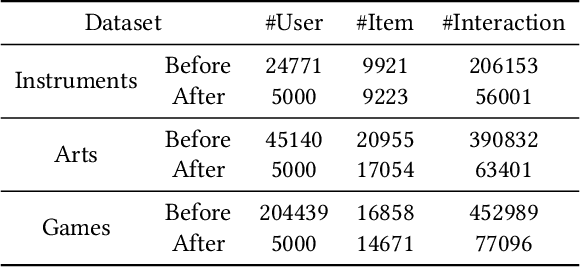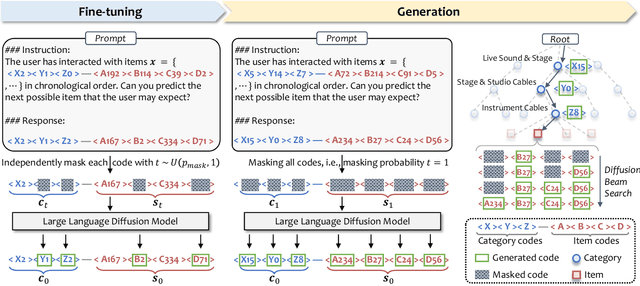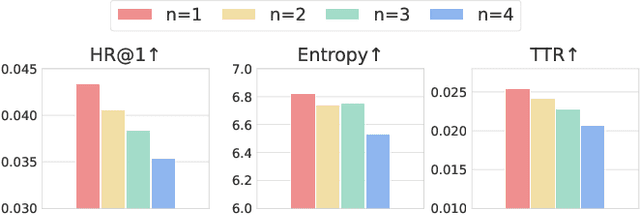Chongming Gao
Uncertainty-aware Generative Recommendation
Feb 12, 2026Abstract:Generative Recommendation has emerged as a transformative paradigm, reformulating recommendation as an end-to-end autoregressive sequence generation task. Despite its promise, existing preference optimization methods typically rely on binary outcome correctness, suffering from a systemic limitation we term uncertainty blindness. This issue manifests in the neglect of the model's intrinsic generation confidence, the variation in sample learning difficulty, and the lack of explicit confidence expression, directly leading to unstable training dynamics and unquantifiable decision risks. In this paper, we propose Uncertainty-aware Generative Recommendation (UGR), a unified framework that leverages uncertainty as a critical signal for adaptive optimization. UGR synergizes three mechanisms: (1) an uncertainty-weighted reward to penalize confident errors; (2) difficulty-aware optimization dynamics to prevent premature convergence; and (3) explicit confidence alignment to empower the model with confidence expression capabilities. Extensive experiments demonstrate that UGR not only yields superior recommendation performance but also fundamentally stabilizes training, preventing the performance degradation often observed in standard methods. Furthermore, the learned confidence enables reliable downstream risk-aware applications.
Don't Start Over: A Cost-Effective Framework for Migrating Personalized Prompts Between LLMs
Jan 17, 2026Abstract:Personalization in Large Language Models (LLMs) often relies on user-specific soft prompts. However, these prompts become obsolete when the foundation model is upgraded, necessitating costly, full-scale retraining. To overcome this limitation, we propose the Prompt-level User Migration Adapter (PUMA), a lightweight framework to efficiently migrate personalized prompts across incompatible models. PUMA utilizes a parameter-efficient adapter to bridge the semantic gap, combined with a group-based user selection strategy to significantly reduce training costs. Experiments on three large-scale datasets show our method matches or even surpasses the performance of retraining from scratch, reducing computational cost by up to 98%. The framework demonstrates strong generalization across diverse model architectures and robustness in advanced scenarios like chained and aggregated migrations, offering a practical path for the sustainable evolution of personalized AI by decoupling user assets from the underlying models.
MindRec: A Diffusion-driven Coarse-to-Fine Paradigm for Generative Recommendation
Nov 18, 2025



Abstract:Recent advancements in large language model-based recommendation systems often represent items as text or semantic IDs and generate recommendations in an auto-regressive manner. However, due to the left-to-right greedy decoding strategy and the unidirectional logical flow, such methods often fail to produce globally optimal recommendations. In contrast, human reasoning does not follow a rigid left-to-right sequence. Instead, it often begins with keywords or intuitive insights, which are then refined and expanded. Inspired by this fact, we propose MindRec, a diffusion-driven coarse-to-fine generative paradigm that emulates human thought processes. Built upon a diffusion language model, MindRec departs from auto-regressive generation by leveraging a masked diffusion process to reconstruct items in a flexible, non-sequential manner. Particularly, our method first generates key tokens that reflect user preferences, and then expands them into the complete item, enabling adaptive and human-like generation. To further emulate the structured nature of human decision-making, we organize items into a hierarchical category tree. This structure guides the model to first produce the coarse-grained category and then progressively refine its selection through finer-grained subcategories before generating the specific item. To mitigate the local optimum problem inherent in greedy decoding, we design a novel beam search algorithm, Diffusion Beam Search, tailored for our mind-inspired generation paradigm. Experimental results demonstrate that MindRec yields a 9.5\% average improvement in top-1 accuracy over state-of-the-art methods, highlighting its potential to enhance recommendation performance. The implementation is available via https://github.com/Mr-Peach0301/MindRec.
MGFRec: Towards Reinforced Reasoning Recommendation with Multiple Groundings and Feedback
Oct 27, 2025



Abstract:The powerful reasoning and generative capabilities of large language models (LLMs) have inspired researchers to apply them to reasoning-based recommendation tasks, which require in-depth reasoning about user interests and the generation of recommended items. However, previous reasoning-based recommendation methods have typically performed inference within the language space alone, without incorporating the actual item space. This has led to over-interpreting user interests and deviating from real items. Towards this research gap, we propose performing multiple rounds of grounding during inference to help the LLM better understand the actual item space, which could ensure that its reasoning remains aligned with real items. Furthermore, we introduce a user agent that provides feedback during each grounding step, enabling the LLM to better recognize and adapt to user interests. Comprehensive experiments conducted on three Amazon review datasets demonstrate the effectiveness of incorporating multiple groundings and feedback. These findings underscore the critical importance of reasoning within the actual item space, rather than being confined to the language space, for recommendation tasks.
Navigating Through Paper Flood: Advancing LLM-based Paper Evaluation through Domain-Aware Retrieval and Latent Reasoning
Aug 07, 2025Abstract:With the rapid and continuous increase in academic publications, identifying high-quality research has become an increasingly pressing challenge. While recent methods leveraging Large Language Models (LLMs) for automated paper evaluation have shown great promise, they are often constrained by outdated domain knowledge and limited reasoning capabilities. In this work, we present PaperEval, a novel LLM-based framework for automated paper evaluation that addresses these limitations through two key components: 1) a domain-aware paper retrieval module that retrieves relevant concurrent work to support contextualized assessments of novelty and contributions, and 2) a latent reasoning mechanism that enables deep understanding of complex motivations and methodologies, along with comprehensive comparison against concurrently related work, to support more accurate and reliable evaluation. To guide the reasoning process, we introduce a progressive ranking optimization strategy that encourages the LLM to iteratively refine its predictions with an emphasis on relative comparison. Experiments on two datasets demonstrate that PaperEval consistently outperforms existing methods in both academic impact and paper quality evaluation. In addition, we deploy PaperEval in a real-world paper recommendation system for filtering high-quality papers, which has gained strong engagement on social media -- amassing over 8,000 subscribers and attracting over 10,000 views for many filtered high-quality papers -- demonstrating the practical effectiveness of PaperEval.
Fine-grained List-wise Alignment for Generative Medication Recommendation
May 26, 2025Abstract:Accurate and safe medication recommendations are critical for effective clinical decision-making, especially in multimorbidity cases. However, existing systems rely on point-wise prediction paradigms that overlook synergistic drug effects and potential adverse drug-drug interactions (DDIs). We propose FLAME, a fine-grained list-wise alignment framework for large language models (LLMs), enabling drug-by-drug generation of drug lists. FLAME formulates recommendation as a sequential decision process, where each step adds or removes a single drug. To provide fine-grained learning signals, we devise step-wise Group Relative Policy Optimization (GRPO) with potential-based reward shaping, which explicitly models DDIs and optimizes the contribution of each drug to the overall prescription. Furthermore, FLAME enhances patient modeling by integrating structured clinical knowledge and collaborative information into the representation space of LLMs. Experiments on benchmark datasets demonstrate that FLAME achieves state-of-the-art performance, delivering superior accuracy, controllable safety-accuracy trade-offs, and strong generalization across diverse clinical scenarios. Our code is available at https://github.com/cxfann/Flame.
Process-Supervised LLM Recommenders via Flow-guided Tuning
Mar 10, 2025Abstract:While large language models (LLMs) are increasingly adapted for recommendation systems via supervised fine-tuning (SFT), this approach amplifies popularity bias due to its likelihood maximization objective, compromising recommendation diversity and fairness. To address this, we present Flow-guided fine-tuning recommender (Flower), which replaces SFT with a Generative Flow Network (GFlowNet) framework that enacts process supervision through token-level reward propagation. Flower's key innovation lies in decomposing item-level rewards into constituent token rewards, enabling direct alignment between token generation probabilities and their reward signals. This mechanism achieves three critical advancements: (1) popularity bias mitigation and fairness enhancement through empirical distribution matching, (2) preservation of diversity through GFlowNet's proportional sampling, and (3) flexible integration of personalized preferences via adaptable token rewards. Experiments demonstrate Flower's superior distribution-fitting capability and its significant advantages over traditional SFT in terms of fairness, diversity, and accuracy, highlighting its potential to improve LLM-based recommendation systems. The implementation is available via https://github.com/Mr-Peach0301/Flower
Addressing Overprescribing Challenges: Fine-Tuning Large Language Models for Medication Recommendation Tasks
Mar 05, 2025Abstract:Medication recommendation systems have garnered attention within healthcare for their potential to deliver personalized and efficacious drug combinations based on patient's clinical data. However, existing methodologies encounter challenges in adapting to diverse Electronic Health Records (EHR) systems and effectively utilizing unstructured data, resulting in limited generalization capabilities and suboptimal performance. Recently, interest is growing in harnessing Large Language Models (LLMs) in the medical domain to support healthcare professionals and enhance patient care. Despite the emergence of medical LLMs and their promising results in tasks like medical question answering, their practical applicability in clinical settings, particularly in medication recommendation, often remains underexplored. In this study, we evaluate both general-purpose and medical-specific LLMs for medication recommendation tasks. Our findings reveal that LLMs frequently encounter the challenge of overprescribing, leading to heightened clinical risks and diminished medication recommendation accuracy. To address this issue, we propose Language-Assisted Medication Recommendation (LAMO), which employs a parameter-efficient fine-tuning approach to tailor open-source LLMs for optimal performance in medication recommendation scenarios. LAMO leverages the wealth of clinical information within clinical notes, a resource often underutilized in traditional methodologies. As a result of our approach, LAMO outperforms previous state-of-the-art methods by over 10% in internal validation accuracy. Furthermore, temporal and external validations demonstrate LAMO's robust generalization capabilities across various temporal and hospital contexts. Additionally, an out-of-distribution medication recommendation experiment demonstrates LAMO's remarkable accuracy even with medications outside the training data.
Future-Conditioned Recommendations with Multi-Objective Controllable Decision Transformer
Jan 13, 2025Abstract:Securing long-term success is the ultimate aim of recommender systems, demanding strategies capable of foreseeing and shaping the impact of decisions on future user satisfaction. Current recommendation strategies grapple with two significant hurdles. Firstly, the future impacts of recommendation decisions remain obscured, rendering it impractical to evaluate them through direct optimization of immediate metrics. Secondly, conflicts often emerge between multiple objectives, like enhancing accuracy versus exploring diverse recommendations. Existing strategies, trapped in a "training, evaluation, and retraining" loop, grow more labor-intensive as objectives evolve. To address these challenges, we introduce a future-conditioned strategy for multi-objective controllable recommendations, allowing for the direct specification of future objectives and empowering the model to generate item sequences that align with these goals autoregressively. We present the Multi-Objective Controllable Decision Transformer (MocDT), an offline Reinforcement Learning (RL) model capable of autonomously learning the mapping from multiple objectives to item sequences, leveraging extensive offline data. Consequently, it can produce recommendations tailored to any specified objectives during the inference stage. Our empirical findings emphasize the controllable recommendation strategy's ability to produce item sequences according to different objectives while maintaining performance that is competitive with current recommendation strategies across various objectives.
Position-aware Graph Transformer for Recommendation
Dec 25, 2024Abstract:Collaborative recommendation fundamentally involves learning high-quality user and item representations from interaction data. Recently, graph convolution networks (GCNs) have advanced the field by utilizing high-order connectivity patterns in interaction graphs, as evidenced by state-of-the-art methods like PinSage and LightGCN. However, one key limitation has not been well addressed in existing solutions: capturing long-range collaborative filtering signals, which are crucial for modeling user preference. In this work, we propose a new graph transformer (GT) framework -- \textit{Position-aware Graph Transformer for Recommendation} (PGTR), which combines the global modeling capability of Transformer blocks with the local neighborhood feature extraction of GCNs. The key insight is to explicitly incorporate node position and structure information from the user-item interaction graph into GT architecture via several purpose-designed positional encodings. The long-range collaborative signals from the Transformer block are then combined linearly with the local neighborhood features from the GCN backbone to enhance node embeddings for final recommendations. Empirical studies demonstrate the effectiveness of the proposed PGTR method when implemented on various GCN-based backbones across four real-world datasets, and the robustness against interaction sparsity as well as noise.
 Add to Chrome
Add to Chrome Add to Firefox
Add to Firefox Add to Edge
Add to Edge